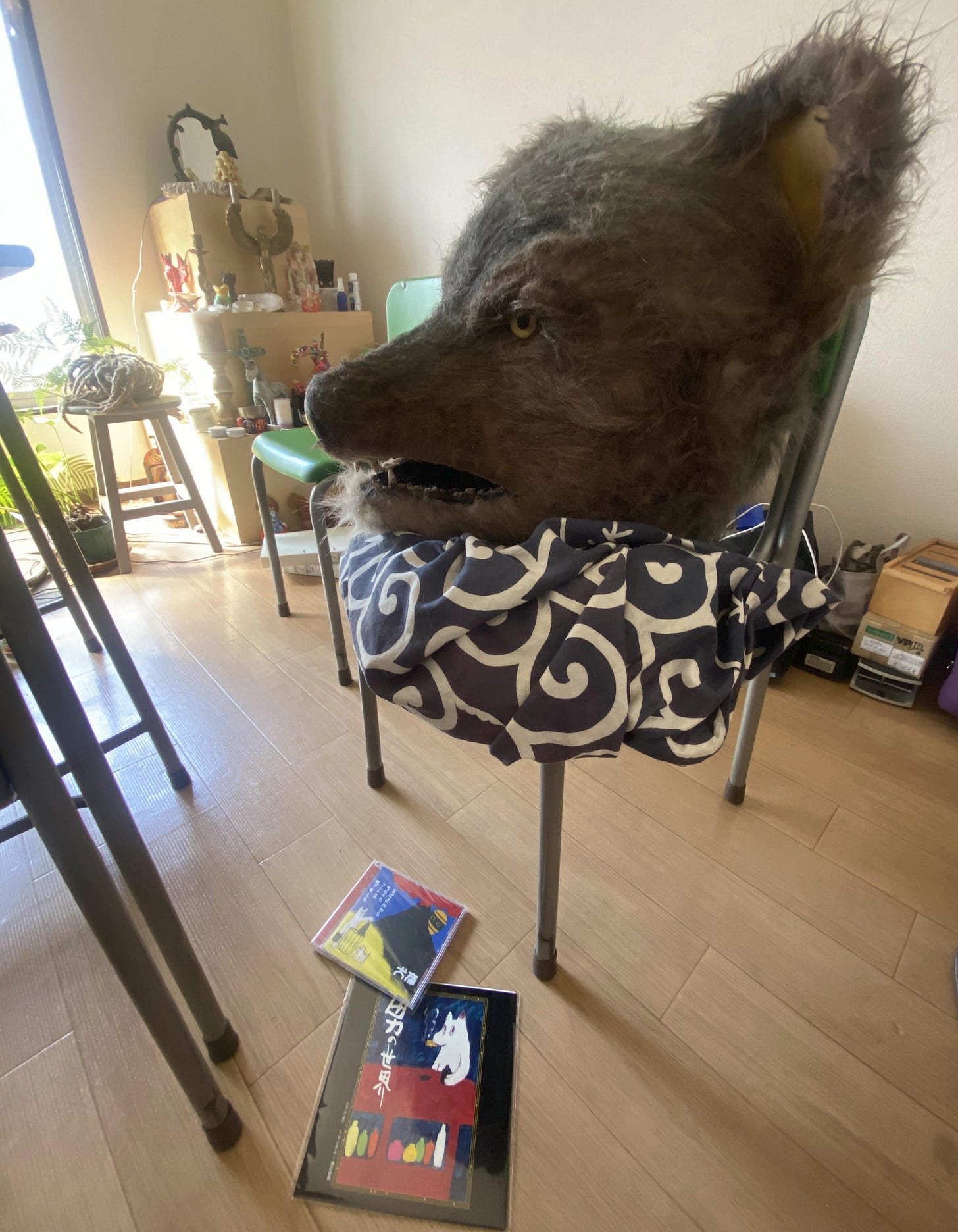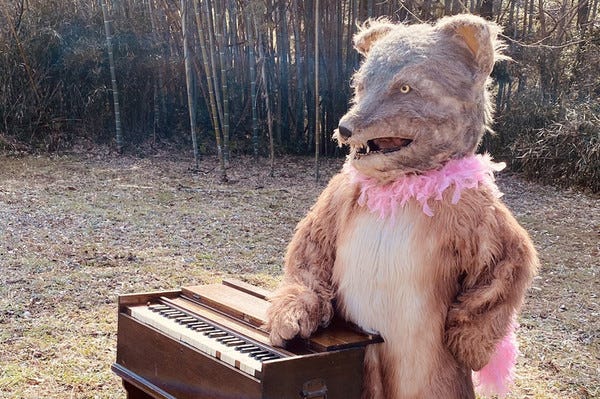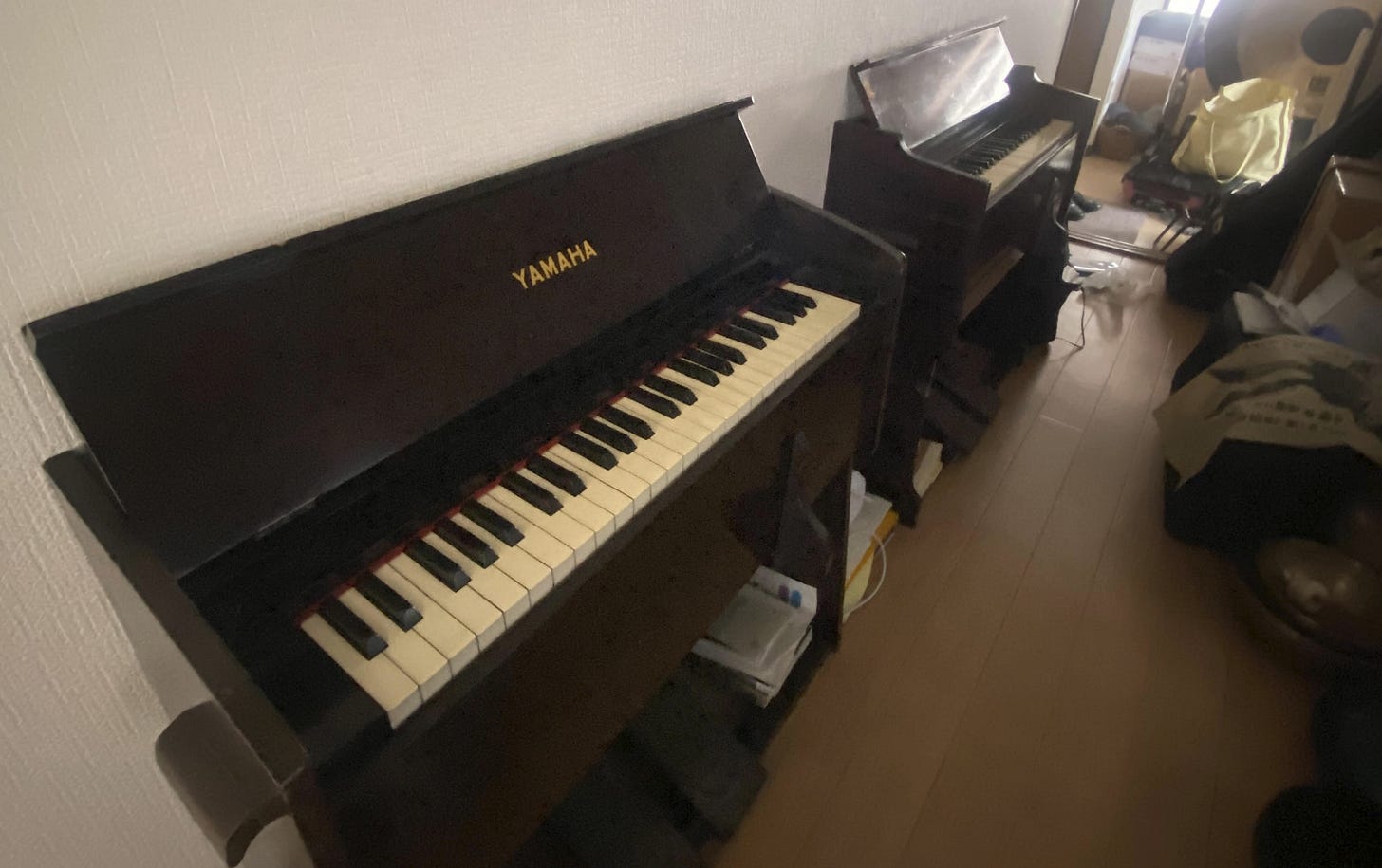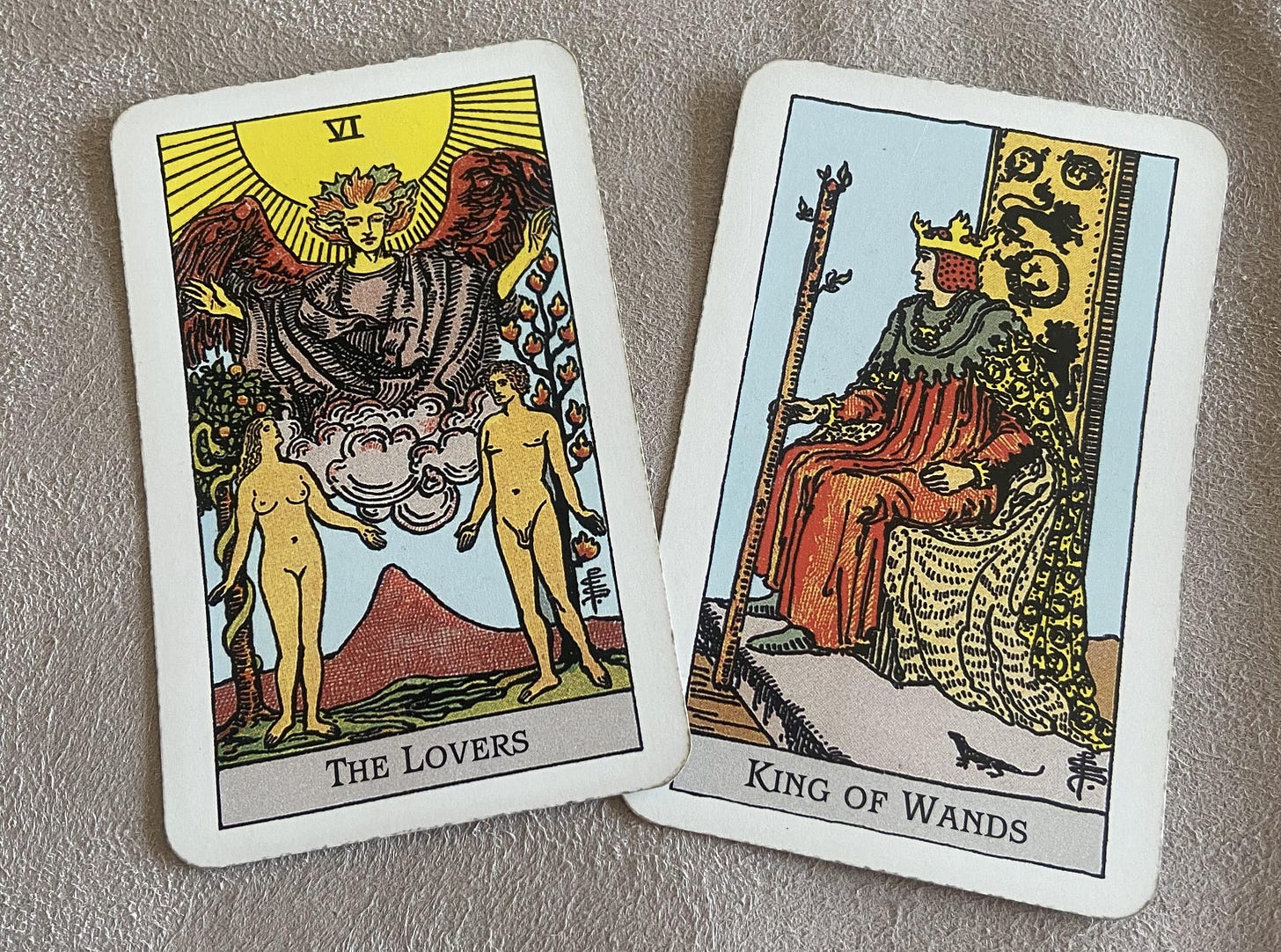"I decided to be a dog": an interview with Shoko Uehara (JON)
An interview with musician and dog woman Shoko Uehara.
Shoko Uehara (JON)
Shoko Uehara, also known as JON, is a musician, tarot reader, and all around interesting person currently residing in Tokyo. She’s most known outside of Japan for her 1996 album Smoke, released on Tzadik as part of the label’s New Japan series highlighting avant-garde music from the island nation. I spoke to Uehara-san on April 10th, 2024 to discuss her music career, pump organs, and why she wears a dog costume when she performs. Junko Okada acted as our interpreter.
Shy Clara Thompson: How’s your day going?
Shoko Uehara: I just woke up. It’s 8 a.m. in Japan.
Oh! Good morning!
Good morning!
You’re currently on tour, right?
I had a tour in March for about a week. Besides my JON project, I sing French chanson too and was performing that kind of music. Now I’m back in Japan.
Let’s get started! What are some of your earliest memories with music?
My parents didn’t listen to music much. However, when I was in junior high school I got good grades and I asked my parents for a copy of The Beatles’ White Album as my reward. That was my first encounter with music!
When did you start making your own music? Do you remember when you got your first instrument?
I played piano when I was young. My parents were very strict, so I didn’t really enjoy playing music much until I started living by myself. Moving out, I bought a pump organ from a vintage store and that was the first time I started making original music.
What were you listening to when you started making music for yourself? Still the Beatles, or had you gotten into different stuff by then?
At the time I bought my organ, I was listening to The Residents, DEVO, Daniel Johnston, Jad Fair, stuff like that. I wanted to start a digital synth band but I couldn’t find anyone to join me. I decided to go solo. My parents had a dog, and I wrote my first song from the perspective of the dog to express its feelings.
Is this why you wear the dog costume? How much later until that became part of your image?
To express the feeling of a dog, I thought I couldn’t be in a human body—so I decided it was better to dress as a dog. I was also influenced by David Lynch; I liked Twin Peaks and wanted to express the obscure atmosphere of his works when I performed.
So you went solo because you couldn’t find a band. Where did you play your first show?
I had friends in the Tokyo underground scene, so I had opportunities to play at some of the live houses in the area.
Did you find people to play with once you got into that underground scene?
I mostly played by myself, but on my first album I played with Tatsuya Yoshida of Ruins.
How did you get into recording? Were you just doing it independently?
When I started, I was just recording myself at home on cassette tapes. There were two magazines that I sent those tapes to, and they ended up liking my recordings. That’s how I got to release my first CD!
Your next album after that was released on John Zorn’s label Tzadik. How did that happen?
I gave my private cassette tapes to Tatsuya Yoshida. At that time, John Zorn was living in Kōenji, Tokyo and Yoshida-san was in contact with him. He passed the tapes along to Zorn and he really liked them, so that’s how I was able to release an album on his label.
Did you know much about Zorn at the time? Did you like his music?
Yes. I listened to his music and got to see him play live. My first international performance was at the Knitting Factory in New York. I was invited there by John Zorn!
What was it like performing outside of Japan for the first time?
I loved it! The feedback was amazing. I got a strong reaction from the audience that I never get in Japan. The American audiences are much more intense.
What are Japanese audiences typically like?
They put on a smile, but they don’t really make any noises or get loud (laughter).
Do you still get to do many shows outside of Japan?
Because of the language barrier I don’t organize international trips by myself, but I’ve been invited to Europe a few times. I’ve recently performed in France and Switzerland!
You mentioned singing chanson earlier. How did you get into that? Is that the type of music you play in France?
She passed away, but the late singer Masako Togawa—a chanson vocalist—used to run a club in Shibuya. I do tarot reading as a side job, and used to do readings at Togawa’s club. I got familiar with chanson music by spending a lot of time there between 2000 and 2010.
I wanted to ask about the tarot readings. I see that you have a website where you post them daily! When did you start doing them?
I started doing them in 1999 and never stopped!
Have you been in touch with Zorn since playing that show in New York?
Not really. He used to release a lot of music from Japanese musicians on his label, but he hasn’t really been doing that very much lately.
By now you’ve worked with a lot of different musicians and done many different genres. When you tour, are you mostly still playing solo or do you ever support other artists?
Once or twice a year I’ll play in a band with other musicians, but it’s usually just me!
I wanted to ask about some studio collaborations that you’ve done. My personal favorite is Inuhiko, your project with the drummer from Gauze. How did the two of you connect?
I met Hiko-san in 2008. He was in Gauze at that time, and he was doing duo projects with lots of other musicians. He suggested that, instead of playing improvised music, he wanted to play drums along to songs I had already written. We released two albums like this.
Do you like the way your songs sound in that hardcore punk context?
Yes, it’s very unique and interesting!
What about your collaboration with Yasushi Utsunomia? That one’s pretty unique too.
The JON project started in 1994, but Satoru Higashiseto, who runs Forever Records in Osaka, organized the recording with Utsunomia-san in 1996.
It’s a pretty unique record for the way it was recorded, isn’t it?
We recorded throughout the year—spring, summer, autumn, winter—and the recording was done outside. We got recordings of cicadas, birds, and other things. We used all the sounds from outside.
Was there any direction from Utsunomia-san or were you given freedom to perform however you wanted?
There was no direction from Utsunomia-san, just suggestions for things I could do that might be interesting.
How did collaborating with him differ from Hiko? What kind of adjustments do you make depending on who you’re collaborating with?
With Utsunomia-san, I just played how I normally do. But since Hiko plays his drums so loud, I had to play my organ loud to match. I cut a hole in the organ and then put a microphone inside so that it wouldn’t be drowned out by the drums.
It seems like you’re singing louder too!
Yes (laughter). I had to sing very loudly!
How do you write your songs?
Most of the time, it comes from humming in my daily life. That’s how I start composing them.

Your music is often described as being like children’s music or nursery rhymes. Do you see it that way?
I’m not consciously trying to make them like nursery rhymes, but it may sound like that because of the way I like to write.
A lot of your songs are about animals. It’s safe to assume you like animals, right?
I’m not good with humans, but I love cats!
One of your albums is about Ochonan-san, your cat. You can even hear him in one of the songs. It’s cute!
Yes, the cat would sometimes sing along with me.
Was that a happy accident, or did you want to include him as part of the record?
I was playing organ at home, and the cat wanted to play with me—so it only seemed right to include him!
What is it about people that make them more difficult to deal with than cats?
(laughter) I’m not good at talking with people unless there’s a shared purpose, like making music together. I generally prefer to spend time by myself.
When you perform and wear the dog costume, is that sort of a statement about how you feel closer to animals?
When I’m wearing the dog costume, it’s the dog singing. I feel awkward being a human, so I decided to be a dog instead. It feels more natural to be something else.
Is it something that gives you more confidence?
When I first started performing, I was afraid of getting up in front of people. I also didn’t like how I looked, so wearing a costume made it easier.
I’m curious about your choice of instrument. You play pump organ and harmonium, and they’re very noisy. You can hear them creaking and flexing as you play. Is that something you like about them?
I have a lot of pump organs. Each one makes a different sound when I pump on the pedals and it’s important that I’m able to capture the unique qualities they have when I play them.
How did you get so many?
Pump organs aren’t produced in Japan anymore. I own five of them and I found them all at antique shops.
How do you decide when one is worth adding to the collection? What qualities do you check for?
Oftentimes, old pump organs are broken. First, I have to check if it actually works. I shop for them on internet auctions too, and I always ask for a sample recording so I can hear that it’s working and what it sounds like. If it’s different from one that I already have, then I want it.
Are they hard to take care of? Do you know how to repair them?
Pump organs are pretty simple on the inside, kind of like a harmonica. There’s not much maintenance involved, but sometimes I need to change the cloth inside that pumps up the air—like an accordion. Once the cloth gets old, it needs to be replaced. That can sometimes get expensive.
What’s your favorite thing about performing live?
Um. (long pause) I like the vibration between myself and the instruments. And even though I don’t like people much, I like when I’m feeling the music along with an audience.
Music becomes a way to connect with people a little easier, then?
When I was young, I didn’t like playing with other children, but I would find common ground with them through music and movies. In a way, it feels like I’m giving back to the music because it helped me navigate so many social situations growing up.
Do you feel like music is still helping you?
Yes, absolutely.
You do a lot of things besides playing music, like tarot readings. What else do you do?
Are you asking about work or hobbies?
I’d like to hear about either!
For work, I do tarot readings. That’s how I make money besides playing music. As far as hobbies, ever since my cat passed away I’ve been traveling a lot.
Why does tarot reading appeal to you?
I find it interesting that I’m receiving a message from somewhere I don’t know. It’s a very mysterious experience. I’m basically an interpreter between the client and the messages that I’m receiving.
Could you do a tarot reading for me?
(laughter) Sure. Just one second. (pause)
I pulled two cards for today. One says you’ll get to do a lot of fun things and you’ll be bestowed with a variety of new information. It’s going to be a fun day!
The advice card says that you should spend some time for yourself. Instead of waiting on another person’s opinion, follow your own intuition!
Thank you! I’ll take that to heart today. So, I have one more question. What’s one thing you like about yourself?
(laughter) I’ve never thought about that!
Is there anything we didn’t get to that you wanted to mention?
Ah! I forgot to mention that now when I play with Hiko-san, I actually play an electric organ instead of a pump organ so that it can be loud enough. I haven’t released anything since about 2004, but I’m looking forward to putting out something new soon!
Well, I’m excited to hear it!
Thank you, I’m excited too.
So you’re still performing with Hiko-san pretty often?
I played with Hiko-san three times last year. [“Last year,” at the time of speaking, was 2023. -Ed.] We haven’t played at all this year, but I’d love to.
I think that’s just about everything I wanted to ask! Thank you so much for giving me your time.
I appreciate that you already had so much knowledge about me! That makes me happy. Thank you! ✿
Thanks for reading this twelfth installment of once bitten, twice shy. Sorry I sat on this interview for so long. I did this over a year ago, and it was actually supposed to be for Tone Glow. I took so long to transcribe this that TG kind of unofficially went defunct, and I got the okay to self-publish it instead. Better late than never, I suppose, especially considering this is the only interview with Uehara-san you can read in English. She’s one of my all-time favorite musicians and it was a real dream to speak with her, so I hope I did her justice.
As ever: if you appreciate the newsletter, consider hitting the Ko-fi link and donating. I’ve got quite the backlog of things I have not published because I’ve been buried under the weight of the world. If you still like me and wanna read my stuff, let me know. My bruised ego needs a little kiss.
Take care, okay? See you next time. 💜






Awesome stuff! So glad Jon is still creating. I've been a fan since she released Smoke on Tzadik in the 90s.
Fascinating interview!